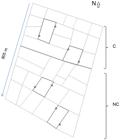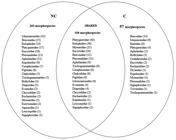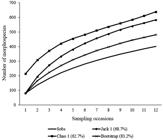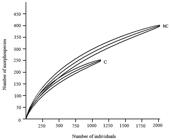Abstract
Among the natural enemies of insect pests in rice fields, parasitoids are especially notable. To better understand the space-time dynamics of these insects, the objectives of this study were to describe and compare groups of parasitoids in organic irrigated rice fields using two management approaches for levee vegetation, and to relate them to the phenological stages of rice cultivation (the seedling, vegetative, and reproductive stages). The samples were taken in a plantation located in Viamão, RS, Brazil. The total area of 18 ha was divided into two parts: a no-cut (NC) subarea in which the wild vegetation of the levees was maintained, and a cut (C) subarea in which the levee vegetation was cut monthly. In each subarea, four Malaise traps considered as pseudo-replicas were installed and remained in the field for 24 hours at each sampling location. Collections occurred twice a month from the beginning of cultivation (October 2012) until harvest (March 2013). A total of 3,184 Hymenoptera parasitoids were collected: 2,038 individuals in the NC subarea and 1,146 in the C subarea. We identified 458 morphospecies distributed in 24 families. Mymaridae was the most abundant and Eulophidae was the richest in both subareas. A total of 198 morphospecies was shared between the subareas, including Platygastridae, Eulophidae, and Mymaridae, which were the families with the highest number of shared species. The richness and abundance of parasitoids varied according to their phenological developmental stages, with peak abundance registering during the vegetative period. The Morisita index identified three groupings, indicating a similarity that was related to the three phases of rice growth and development: seedling, vegetative and post-harvest.
Keywords:
Oryza sativa; conservational biological control; habitat management

 Thumbnail
Thumbnail
 Thumbnail
Thumbnail
 Thumbnail
Thumbnail
 Thumbnail
Thumbnail
 Thumbnail
Thumbnail
 Thumbnail
Thumbnail
 Thumbnail
Thumbnail
 Thumbnail
Thumbnail







